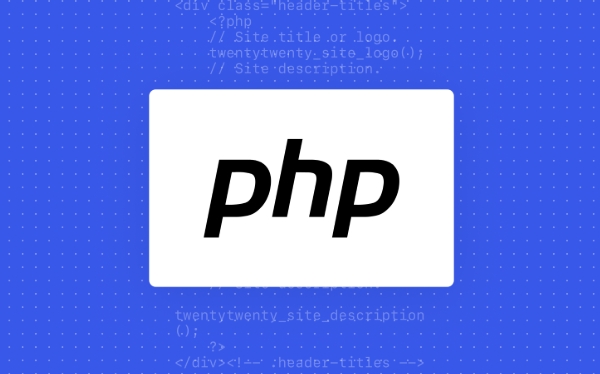 Backend Development
Backend Development
 PHP Tutorial
PHP Tutorial
 Analyzing Time Complexity of Key Operations in PHP Associative Arrays
Analyzing Time Complexity of Key Operations in PHP Associative Arrays
Analyzing Time Complexity of Key Operations in PHP Associative Arrays
Aug 04, 2025 am 08:29 AMPHP associative arrays are implemented as ordered hash tables, enabling efficient key-value operations; 1. Insertion: average O(1), worst O(n) due to collisions or resizing; 2. Lookup: average O(1), worst O(n) with collisions; 3. Deletion: average O(1), worst O(n) if many collisions; 4. Key checks (isset/array_key_exists): average O(1), worst O(n); 5. Iteration: O(n) in all cases; 6. array_merge: O(m n); 7. array_keys/array_values: O(n); practical use favors isset() for non-null checks, avoids untrusted keys, minimizes large merges, and treats arrays as fast hash maps with rare but possible performance degradation under adversarial conditions.

PHP associative arrays—also known as associative arrays or simply arrays—are actually ordered hash tables under the hood. This makes them incredibly versatile, allowing key-value storage with mixed key types (strings and integers) and dynamic resizing. When analyzing time complexity, it's essential to understand that PHP arrays are implemented as hash tables, which directly affects the performance of common operations.

Below is an analysis of the time complexity for key operations in PHP associative arrays, based on the underlying hash table implementation.
1. Insertion (Adding an Element)
Operation: $array[$key] = $value;

Average Case: O(1)
Insertion involves computing the hash of the key and placing the key-value pair in the appropriate bucket. With a good hash function and sufficient capacity, this is constant time.-
Worst Case: O(n)
In rare cases, such as a hash collision attack or when the array resizes (rehashing all elements), insertion can degrade to O(n). However, resizing is amortized over many insertions, so average performance remains O(1).
Note: PHP uses a mechanism called "incremental rehashing" during expansion, which helps reduce performance spikes.
2. Lookup (Accessing by Key)
Operation: $value = $array[$key];
Average Case: O(1)
Hash computation and direct bucket access make lookups very fast.Worst Case: O(n)
Occurs when all keys collide in the same bucket (e.g., due to malicious input or poor hash distribution). In practice, this is mitigated by PHP's internal protections against collision attacks (e.g., SipHash used in PHP 7 ).
3. Deletion (Unset by Key)
Operation: unset($array[$key]);
Average Case: O(1)
Finding the element via hash and removing it is typically constant time.Worst Case: O(n)
Only if there are many hash collisions in the target bucket. Otherwise, deletion is efficient.
Note:
unset()doesn't immediately compact memory. The internal hash table marks the entry as deleted, which may affect iteration but not lookup performance significantly.
4. Key Existence Check
Operation: array_key_exists($key, $array) or isset($array[$key])
isset($array[$key]): O(1) average
Fast hash-based lookup. Returns false for null values (so not suitable if you need to distinguish null from absence).array_key_exists($key, $array): O(1) average
Also hash-based, but returns true even if the value is null.Worst Case: O(n) due to collisions (same as lookup).
5. Iteration (Using foreach)
Operation: foreach ($array as $key => $value)
-
Time Complexity: O(n)
Iterating over all elements takes linear time, as each element is visited exactly once, regardless of key distribution.
Note: PHP arrays maintain internal ordering (insertion order), so iteration order is predictable.
6. Array Merging
Operation: array_merge($a, $b)
-
Time Complexity: O(m n)
Where m and n are the number of elements in the two arrays. Each element is copied, and string keys are rehashed. Numeric keys are reindexed, which adds overhead.
Note: Merging large arrays can be expensive due to rehashing and memory allocation.
7. Getting All Keys or Values
Operations: array_keys($array), array_values($array)
-
Time Complexity: O(n)
Both functions must traverse the entire array and return a new array with keys or values.
Summary of Time Complexities
| Operation | Average Case | Worst Case |
|---|---|---|
Insertion ($arr[$k] = $v) |
O(1) | O(n) |
Lookup ($arr[$k]) |
O(1) | O(n) |
Deletion (unset($arr[$k])) |
O(1) | O(n) |
Key check (isset, array_key_exists) |
O(1) | O(n) |
Iteration (foreach) |
O(n) | O(n) |
array_merge |
O(m n) | O(m n) |
array_keys, array_values
|
O(n) | O(n) |
Practical Implications
-
Use
isset()for fast key checks when you don’t need to distinguishnullfrom absence. - Avoid using associative arrays with untrusted keys in security-sensitive contexts (though PHP mitigates hash flooding).
- For large datasets, consider object storage or specialized data structures if performance becomes a bottleneck.
- Repeated merging or copying of large arrays can be costly—consider references or lazy evaluation.
In most real-world applications, PHP associative arrays perform efficiently due to optimized hash table implementation. While worst-case scenarios exist, they are rare in practice. Understanding these complexities helps in writing scalable PHP code, especially in performance-critical applications.
Basically, treat PHP arrays as fast hash maps—great for average-case O(1) operations, but be mindful of edge cases.
The above is the detailed content of Analyzing Time Complexity of Key Operations in PHP Associative Arrays. For more information, please follow other related articles on the PHP Chinese website!

Hot AI Tools

Undress AI Tool
Undress images for free

Undresser.AI Undress
AI-powered app for creating realistic nude photos

AI Clothes Remover
Online AI tool for removing clothes from photos.

Clothoff.io
AI clothes remover

Video Face Swap
Swap faces in any video effortlessly with our completely free AI face swap tool!

Hot Article

Hot Tools

Notepad++7.3.1
Easy-to-use and free code editor

SublimeText3 Chinese version
Chinese version, very easy to use

Zend Studio 13.0.1
Powerful PHP integrated development environment

Dreamweaver CS6
Visual web development tools

SublimeText3 Mac version
God-level code editing software (SublimeText3)
 PHP Variable Scope Explained
Jul 17, 2025 am 04:16 AM
PHP Variable Scope Explained
Jul 17, 2025 am 04:16 AM
Common problems and solutions for PHP variable scope include: 1. The global variable cannot be accessed within the function, and it needs to be passed in using the global keyword or parameter; 2. The static variable is declared with static, and it is only initialized once and the value is maintained between multiple calls; 3. Hyperglobal variables such as $_GET and $_POST can be used directly in any scope, but you need to pay attention to safe filtering; 4. Anonymous functions need to introduce parent scope variables through the use keyword, and when modifying external variables, you need to pass a reference. Mastering these rules can help avoid errors and improve code stability.
 How to handle File Uploads securely in PHP?
Jul 08, 2025 am 02:37 AM
How to handle File Uploads securely in PHP?
Jul 08, 2025 am 02:37 AM
To safely handle PHP file uploads, you need to verify the source and type, control the file name and path, set server restrictions, and process media files twice. 1. Verify the upload source to prevent CSRF through token and detect the real MIME type through finfo_file using whitelist control; 2. Rename the file to a random string and determine the extension to store it in a non-Web directory according to the detection type; 3. PHP configuration limits the upload size and temporary directory Nginx/Apache prohibits access to the upload directory; 4. The GD library resaves the pictures to clear potential malicious data.
 Commenting Out Code in PHP
Jul 18, 2025 am 04:57 AM
Commenting Out Code in PHP
Jul 18, 2025 am 04:57 AM
There are three common methods for PHP comment code: 1. Use // or # to block one line of code, and it is recommended to use //; 2. Use /.../ to wrap code blocks with multiple lines, which cannot be nested but can be crossed; 3. Combination skills comments such as using /if(){}/ to control logic blocks, or to improve efficiency with editor shortcut keys, you should pay attention to closing symbols and avoid nesting when using them.
 How Do Generators Work in PHP?
Jul 11, 2025 am 03:12 AM
How Do Generators Work in PHP?
Jul 11, 2025 am 03:12 AM
AgeneratorinPHPisamemory-efficientwaytoiterateoverlargedatasetsbyyieldingvaluesoneatatimeinsteadofreturningthemallatonce.1.Generatorsusetheyieldkeywordtoproducevaluesondemand,reducingmemoryusage.2.Theyareusefulforhandlingbigloops,readinglargefiles,or
 Tips for Writing PHP Comments
Jul 18, 2025 am 04:51 AM
Tips for Writing PHP Comments
Jul 18, 2025 am 04:51 AM
The key to writing PHP comments is to clarify the purpose and specifications. Comments should explain "why" rather than "what was done", avoiding redundancy or too simplicity. 1. Use a unified format, such as docblock (/*/) for class and method descriptions to improve readability and tool compatibility; 2. Emphasize the reasons behind the logic, such as why JS jumps need to be output manually; 3. Add an overview description before complex code, describe the process in steps, and help understand the overall idea; 4. Use TODO and FIXME rationally to mark to-do items and problems to facilitate subsequent tracking and collaboration. Good annotations can reduce communication costs and improve code maintenance efficiency.
 Quick PHP Installation Tutorial
Jul 18, 2025 am 04:52 AM
Quick PHP Installation Tutorial
Jul 18, 2025 am 04:52 AM
ToinstallPHPquickly,useXAMPPonWindowsorHomebrewonmacOS.1.OnWindows,downloadandinstallXAMPP,selectcomponents,startApache,andplacefilesinhtdocs.2.Alternatively,manuallyinstallPHPfromphp.netandsetupaserverlikeApache.3.OnmacOS,installHomebrew,thenrun'bre
 How to access a character in a string by index in PHP
Jul 12, 2025 am 03:15 AM
How to access a character in a string by index in PHP
Jul 12, 2025 am 03:15 AM
In PHP, you can use square brackets or curly braces to obtain string specific index characters, but square brackets are recommended; the index starts from 0, and the access outside the range returns a null value and cannot be assigned a value; mb_substr is required to handle multi-byte characters. For example: $str="hello";echo$str[0]; output h; and Chinese characters such as mb_substr($str,1,1) need to obtain the correct result; in actual applications, the length of the string should be checked before looping, dynamic strings need to be verified for validity, and multilingual projects recommend using multi-byte security functions uniformly.
 Learning PHP: A Beginner's Guide
Jul 18, 2025 am 04:54 AM
Learning PHP: A Beginner's Guide
Jul 18, 2025 am 04:54 AM
TolearnPHPeffectively,startbysettingupalocalserverenvironmentusingtoolslikeXAMPPandacodeeditorlikeVSCode.1)InstallXAMPPforApache,MySQL,andPHP.2)Useacodeeditorforsyntaxsupport.3)TestyoursetupwithasimplePHPfile.Next,learnPHPbasicsincludingvariables,ech






